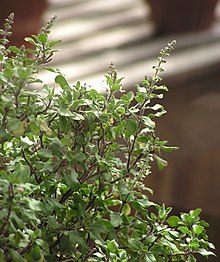| Tulasi | |
|---|---|
Personification of the Tulasi plant | |
 Murti of Vrinda at ISKCON Temple, Vrindavan | |
| Other names | Vrinda |
| Devanagari | तुलसी |
| Sanskrit transliteration | Tulasi |
| Affiliation | Devi, Lakshmi |
| Abode | Bhuloka, Vaikuntha |
| Symbol | Tulasi plant |
| Festivals | Tulasi Vivaha |
| Parents | |
| Consort |
|

| Part of a series on |
| Vaishnavism |
|---|
 |
Tulasi (Sanskrit: तुलसी, romanized: Tulasī), Tulsi or Vrinda (holy basil) is a sacred plant in Hindu tradition. Hindus regard it as an earthly manifestation of the goddess Tulasi; she is regarded as the avatar of Lakshmi, and thus the consort of the god Vishnu. In another iteration, as Vrinda, she is married to Jalandhara. The offering of its leaves is recommended in ritualistic worship of Vishnu and his avatars, like Krishna and Vithoba.
Traditionally, the tulasi is planted in the center of the central courtyard of Hindu houses.[2] The plant is cultivated for religious purposes, and for its essential oil.